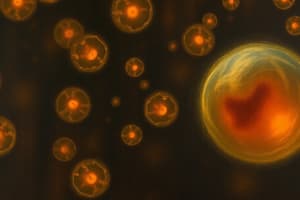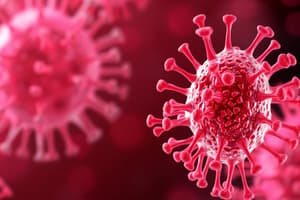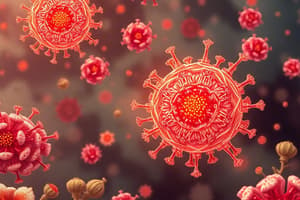Podcast
Questions and Answers
Explain the role of MHC class I molecules in the activation of cytotoxic T cells (Tc cells). Describe the process of antigen presentation and recognition by Tc cells.
Explain the role of MHC class I molecules in the activation of cytotoxic T cells (Tc cells). Describe the process of antigen presentation and recognition by Tc cells.
MHC class I molecules are expressed on all nucleated cells in the body. They present fragments of intracellular proteins, including viral or bacterial proteins, to Tc cells. When a cell is infected, it processes foreign proteins through the proteasome and delivers them to the ER, where they bind to MHC class I molecules. The MHC I-peptide complexes are then transported to the cell surface. Tc cells, with their TCRs, recognize these MHC I-peptide complexes, initiating the activation of the Tc cell. This leads to the release of cytotoxic granules, containing perforin and granzymes, which induce apoptosis in the infected cell.
Describe the differences between MHC class I and MHC class II molecules in terms of their expression, antigen presentation, and the type of T cell they interact with.
Describe the differences between MHC class I and MHC class II molecules in terms of their expression, antigen presentation, and the type of T cell they interact with.
MHC class I are expressed on all nucleated cells, while MHC class II are expressed on antigen-presenting cells (APCs), such as macrophages, dendritic cells, and B cells. MHC I presents peptides derived from intracellular proteins to cytotoxic T cells (CD8+ T cells), while MHC II presents peptides derived from extracellular proteins to helper T cells (CD4+ T cells).
MHC I molecules are involved in presenting antigens from within a cell, such as viral proteins, to CD8+ T cells. MHC II molecules present antigens from outside the cell, like bacterial proteins, to CD4+ T cells. This allows the immune system to target both intracellular and extracellular pathogens.
What are the key roles of helper T cells (Th cells) in the immune response? Explain how Th cells contribute to the activation of other immune cells, such as B cells and macrophages.
What are the key roles of helper T cells (Th cells) in the immune response? Explain how Th cells contribute to the activation of other immune cells, such as B cells and macrophages.
Helper T cells (Th cells) play a crucial role in coordinating the immune response. They activate other immune cells, including B cells and macrophages, leading to a more robust and effective response. They secrete cytokines, such as IFN-gamma and TNF-alpha, that stimulate the proliferation and activation of Tc cells, promoting the killing of infected cells. Th cells also stimulate B cells to differentiate into plasma cells, which produce antibodies against specific antigens. Additionally, Th cells activate macrophages to kill engulfed microbes.
Explain the process of clonal expansion of T cells after activation by antigen-presenting cells (APCs), specifically highlighting the roles of effector cells and memory cells.
Explain the process of clonal expansion of T cells after activation by antigen-presenting cells (APCs), specifically highlighting the roles of effector cells and memory cells.
How does the human immunodeficiency virus (HIV) affect the immune system, leading to the development of acquired immunodeficiency syndrome (AIDS)?
How does the human immunodeficiency virus (HIV) affect the immune system, leading to the development of acquired immunodeficiency syndrome (AIDS)?
Describe the process of B cell activation, including the role of helper T cells (Th cells) and the production of antibodies. Explain the importance of memory B cells.
Describe the process of B cell activation, including the role of helper T cells (Th cells) and the production of antibodies. Explain the importance of memory B cells.
Explain how the immune system's response to an infection differs between a primary infection and a secondary infection. Specifically, highlight the role of memory cells.
Explain how the immune system's response to an infection differs between a primary infection and a secondary infection. Specifically, highlight the role of memory cells.
Describe the role of antigen-presenting cells (APCs) in initiating the adaptive immune response. Explain how APCs bridge the innate and adaptive immune systems.
Describe the role of antigen-presenting cells (APCs) in initiating the adaptive immune response. Explain how APCs bridge the innate and adaptive immune systems.
Describe the process by which a B cell is activated in a lymph node, including the roles of antigen presentation, T cell interaction, and clonal selection.
Describe the process by which a B cell is activated in a lymph node, including the roles of antigen presentation, T cell interaction, and clonal selection.
Explain the role of lymph node macrophages and lymph fluid in the immune response to antigen.
Explain the role of lymph node macrophages and lymph fluid in the immune response to antigen.
Compare and contrast the process of T cell activation with B cell activation in the lymph node. Highlight the key differences and similarities.
Compare and contrast the process of T cell activation with B cell activation in the lymph node. Highlight the key differences and similarities.
Explain how the time frame for B cell activation and proliferation in the lymph node contributes to the effectiveness of the adaptive immune response.
Explain how the time frame for B cell activation and proliferation in the lymph node contributes to the effectiveness of the adaptive immune response.
Describe the importance of clonal selection in B cell activation. How does this process contribute to the specificity of the immune response?
Describe the importance of clonal selection in B cell activation. How does this process contribute to the specificity of the immune response?
Flashcards
T-cells
T-cells
White blood cells that mature in the thymus and play a central role in immune response.
Cytotoxic T cells
Cytotoxic T cells
Also known as CD8 or Tc cells, they kill cancerous or infected cells directly.
Helper T cells
Helper T cells
CD4 or Th cells that activate other immune cells via cytokine release.
MHC molecules
MHC molecules
Signup and view all the flashcards
MHC I
MHC I
Signup and view all the flashcards
MHC II
MHC II
Signup and view all the flashcards
Antigen presentation
Antigen presentation
Signup and view all the flashcards
Clonal expansion of T cells
Clonal expansion of T cells
Signup and view all the flashcards
T cell activation
T cell activation
Signup and view all the flashcards
B cell activation
B cell activation
Signup and view all the flashcards
Role of lymph nodes
Role of lymph nodes
Signup and view all the flashcards
Plasma cell production
Plasma cell production
Signup and view all the flashcards
B cell clonal selection
B cell clonal selection
Signup and view all the flashcards
Study Notes
T-Cell Activation
- Maturation: Mature in the thymus
- TCR: Possess a T-cell receptor (TCR) on their surface
- Antigen Recognition: Each T-cell recognizes a different antigen presented on the surface of infected cells. Effective against viruses and intracellular pathogens.
- Types:
- Cytotoxic T cells (CD8/Tc cells): Kill cancerous or infected cells
- Helper T cells (CD4/Th cells): Activate the immune system via cytokines
- Antigen Presentation via MHC: T cells can only recognize antigens presented on a Major Histocompatibility Complex (MHC) molecule.
- MHC Class I (MHC I): Present on all nucleated cells in the body. Foreign proteins are digested by proteasomes, and the foreign peptides are delivered to MHC I. This presentation is recognized by cytotoxic T cells, leading to cell killing.
- Process:
- Infected cell presents antigen on MHC I.
- T-cell recognizes the antigen via its TCR.
- Cytotoxic T cell kills infected cell using granzymes and perforin.
- Process:
- MHC Class II (MHC II): Present on dendritic cells and macrophages. Used for surveillance and triggering an immune response.
- Process:
- Microbes are digested in phagosomes.
- Microbial peptides are loaded onto MHC II and presented on the cell surface.
- Helper T cells recognize this and secrete cytokines to activate antigen-presenting cells (APCs).
- Example: Dendritic cells in lymph nodes present antigens on MHC II.
- Process:
Antigen Presentation (Overview)
- Infection Initiates the Process:
- Antigen Presentation by Dendritic Cells: Dendritic cells present antigens to T cells within lymph nodes.
- T-Cell Activation: T cells are activated.
- Cytotoxic T cell Action: Cytotoxic T cells kill infected cells.
- Helper T Cell Action: Helper T cells activate dendritic cells/macrophages presenting the antigen.
- Production of Memory Cells: Memory T cells are produced.
Clonal Expansion of T-Cells
- Activation by Dendritic Cells: Activated by dendritic cell proliferation (takes 1-2 days).
- Effector Cells: Activated effector cells (Th CD4 and Tc CD8) leave lymphoid tissue to function.
- Th Cell Importance:
- Enable B-cells to differentiate into plasma and memory cells.
- Stimulate cytotoxic T cells (Tc)
- Activate macrophages to kill pathogens.
- HIV Impact: HIV targets CD4 cells, severely weakening the immune system.
B-Cell Activation
-
Migration to Lymph Nodes/Spleen: Naive T cells and B cells migrate to lymph nodes and spleen after production. They circulate continually.
-
Antigen Entry Paths: Microbes enter the body and antigens may be presented in lymph nodes (via dendritic cells). The antigen might enter the blood, directing it to the spleen.
-
Antigen Presentation in Lymph Nodes: Lymph node macrophages process viruses/large antigens, lymph fluid carries small, soluble antigens.
-
Antigen Recognition by T cells: T cells look for antigen-presenting dendritic cells (DCs).
-
T-cell Activation: If T-cells detect an antigen, the clone is activated.
- If antigen is a soluble protein - B-cells wait for Th cell activation.
-
B-Cell Activation and Processing:
- If antigen is detected, B cells stay in the lymph node.
- B cells bind antigens with IgD, engulf them, process the antigen, and present it via MHC II.
- B cells seek out Th cells.
- Activation of a B cell results in a plasma cell.
-
Timeline: B-cell activation and resulting plasma cell proliferation takes 4-7 days in lymph nodes. This produces ~5000 plasma cells.
-
Antibody Production: Plasma cells produce 5 classes of antibodies (GAMED).
Studying That Suits You
Use AI to generate personalized quizzes and flashcards to suit your learning preferences.
![Lecture 06: T-Cell Activation and B cell Activation [SEQ 2]](https://assets.quizgecko.com/cdn-cgi/image/width=800,height=300,fit=crop,quality=75,format=webp/quiz/823e4a03caafa627290111b4012c4626.jpg)


![Lecture 06: T-cells and B-cell activation [MCQ 1]](https://assets.quizgecko.com/cdn-cgi/image/width=300,height=200,fit=crop,quality=75,format=webp/quiz/d48abe08a72d88817373184f6d896c08.jpg)
